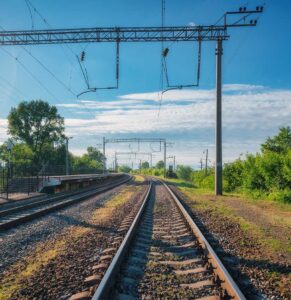As our most advanced online course, it is ideal for mid- to high-level professionals looking to gain a detailed whole-system perspective of the rail industry.
This is an online asynchronous course.
There are no requirements for study.
Please use our short course application form to submit an application for this course, or contact learnserve@railwayoperators.co.uk for more information.
Rail Master: A Whole System View of Rail is not eligible for Apprentice levy funding.

The Rail Master: A Whole System View of Rail course includes 14 modules of learning packed with written information supported by video content; critical, reflective and interactive activities; and quizzes to assess learning.
This is our most advanced online course, offering a deep understanding of the whole system of rail operations. The modules can be taken in any order to prioritise and personalise learning.
Upon completion of the course, learners can print an e-copy of their certificate or request a hardcopy of their certificate to be posted to them.
For more information or to register your interest, please email the Rail Academy team at learnserve@railwayoperators.co.uk.

Each of the 14 modules are split into 6 sub-topics:
1.1 Management Processes
1.2 Business & Management
1.3 Managing Finance
1.4 Managing People
1.5 Managing Safety
1.6 Managing Projects
2.1 The Development of the Railways
2.2 The Railway Business Organisation
2.3 Basic Train Operation
2.4 Train Planning
2.5 Performance Management
2.6 Customer Service
3.1 Signalling
3.2 Infrastructure
3.3 Trains
3.4 Publications
3.5 Degraded-Mode Working
3.6 Safety
4.1 Communication Channels
4.2 Stakeholders in Rail
4.3 Key Areas of Rail Customer Service
4.4 Passenger Information During Disruption (PIDD)
4.5 National Rail Passenger Survey (NRPS)
4.6 Business Process Improvement
5.1 Introduction & Basic
5.2 Signalling
5.3 Train Services & Performance
5.4 Railway Infrastructure
5.5 Customer Services
5.6 Operational Facilities
6.1 Business Case for Rail
6.2 Organisational Structure
6.3 Government & Other Agencies
6.4 Rolling Stock Organisationally
6.5 Railway Business Processes
6.6 Innovation
7.1 Introduction to Railway Systems
7.2 Civil Engineering & Infrastructure
7.3 Railway Electrification
7.4 Maintenance & Renewals
7.5 Traction & Rolling Stock
7.6 Train Control & Communications
8.1 What’s the Point of Train Planning?
8.2 Timetabling Rules & Constraints
8.3 Traction, Traincrew & Operational Resources
8.4 Processes, Systems & Resourcing
8.5 Delivering Engineering Work
8.6 The Impact of Planning on Performance
9.1 Health & Safety Law & Legislation
9.2 Railway Safety Legislation & Standards
9.3 Key Safety Authorities, Agencies & Organisations
9.4 Risk Management
9.5 Safety Management Systems (SMS)
9.6 Health & Safety in the Workplace
10.1 Emergency Planning for Major Incidents
10.2 Planning for Big Events
10.3 Mishap Management
10.4 The Role of the RIO/TOLO
10.5 Accident Investigation
10.6 Human Factors in Accidents
11.1 Purpose of Operational Planning
11.2 Infrastructure
11.3 Operational Planning Process
11.4 Planning Timescales
11.5 Modern Developments
11.6 Capacity
12.1 Background & Principles
12.2 Movement & Safety
12.3 Traffic Management
12.4 Urban Rail Systems
12.5 Modern Train Control
12.6 International Train Control Systems
13.1 Key Economic Principles
13.2 Railways as a Business
13.3 Passenger & Freight Demand
13.4 Marketing & Sales
13.5 Costs
13.6 Investment
14.1 Culture
14.2 Resourcing
14.3 Staffing & Planning
14.4 Assessment, Competence & Compliance
14.5 Change Management
14.6 Railway Business Terminology